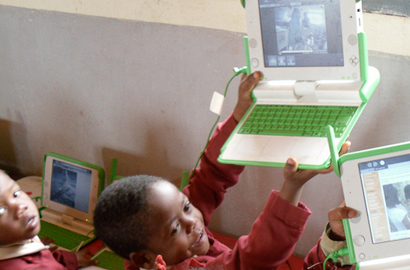By Semaj Itosno, Nairobi, Kenya
The new Kenyan government headed by President Uhuru Kenyatta intends to dish out laptops to all class one pupils beginning next year.
The president said his government would give a solar-powered laptop to every class one pupil starting next year and already plans are in high gear to ensure that is done.
The initiative is among promises made by president Uhuru Kenyatta’s Jubilee Coalition during the campaigns.
The “laptop promise” would see Kenya join countries like Rwanda and Mongolia, where children use laptops to learn, play and access information on different subjects.
“Indeed, the idea of a laptop per child is being pursued by UN as a step to achieving the Millennium Development Goals. MIT Media Lab has designed and manufactured a $100 laptop — the cheapest in the world,” argues John Cheruiyot, a Nakuru resident in Kenya.
A technology enthusiast, Cheruiyot says the MIT ultra-low cost, energy efficient, and powered by Linux software laptop is designed to promote social and economic development in Third World nations.
“That means if the Jubilee government is seeking to use the $100 laptop for schools, then they will become possibly the first government in the developing world to embrace the digital age with passion and enthusiasm.
If one million such laptops will be required next year, it will cost 100 million dollars or Sh8billion.”
Approximately 1.2 million pupils would access computers annually meaning Kenya shall have a young, ICT-savvy populace in the next decade.
The president also promised to inject Sh6 billion into youth and women development funds so that the two groups can access grants to do business.
According to Kirimi Mitambo, a publishing consultant and director, Sanaa Yetu Creatives, for the fruits of ICT to be realised, there is however need to tackle the challenge of ICT-illiterate teachers by equipping them with the requisite skills.
“If they can be made to see the bigger picture, teachers would be more than willing to practice and use their newly acquired skills. Doesn’t this sound like killing two birds with one stone? Any change or transformation must have supporting pillars,” says Mr Mitambo.
Mitambo said the journey towards e-learning has been relatively smooth in Kenya having began just over a decade ago by the ministry of Education, through the Kenya Institute of Curriculum Development (KICD).
“There have been numerous e-learning seminars for education stakeholders that have seen publishers and ICT experts present papers on the way forward. In addition, KICD has led by example by offering e-materials both on its website and libraries,” explains Mitambo.
Kenya’s ministry of Education has an ICT department whose mandate is to formulate and supervise ICT guidelines in schools.
